One Woman's Journey
90s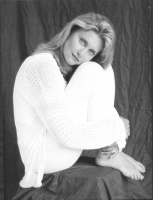
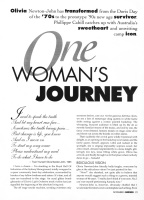
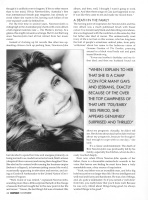
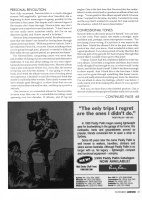
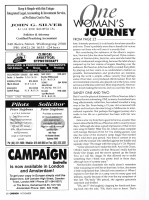
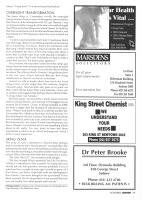
Phillippe Cahill
I need to speak the truth
And let me heart run free
Sometimes the truth brings pain
But change is life, you know
And as I move on
To start my song anew
Please understand my need
To do what I have to do
(Trust Yourself, Olivia Newton-John, 1993)
I have a dream I'm standing in the Royal Hall Of Industries of the Sydney Showground, totally wrapped in a queer community feast day celebration, surrounded by hordes of my fellow brethren and sisters. It's 4am, and all eyes are transfixed to the stage. An aural glitter bomb glissando of Electric Light Orchestra mock violins has just signalled the beginning of the absolute living end. The off stage smoke machine, working overtime only moments before, cuts out. As the gaseous detritus clears, we see a line of statuesque drag queens in white faerie shifts resting against a cosmic painted backdrop. The whooping, buoyant audience is lifted up by the oh so sweetly familiar strains of the music, and one by one, the fancy cross-dressed, fantasy muses on stage come alive and shoot out across the boards on roller skates. Then suddenly the crowd goes wildly hysterical with delight, as an opening in the backdrop is revealed, and the faerie queen, herself, appears. Lithe and radiant in the spotlight, she is singing impossibly soprano sweet, her arms raised, dressed resplendently in a knee length, glitteringly low key, loose fitting white gown. Olivia has arrived, and finally brought us to that place where nobody dares to go Xanadu!
RIDICULOUS VISION Olivia Newton-John literally belly-laughs, overcome by glee at the ridiculous vision I've just painted for her. Now?
she shrieked, not quite able to believe that anyone would suggest such a thing to a grown, married woman of 46 years. I really don't think it's me now. No, I can't see myself performing Xanadu now.
Newton-John is, however, obviously chuffed that I would take the time to even contemplate such a thing. Even though it is unlikely ever to happen. If for no other reason than to her mind, Olivia Newton-John, Australia's first true international female pop megastar, has already arrived where she wants to be, leaving such follies of her over-exposed youth far behind her.
For the first time in several years, Newton-John is riding high in the Australian pop charts with a new album of all original material, Gaia One Woman's Journey. At a glance, this might not seem so strange. But it's not that long since Newton-John had all but retired from her music career. Instead of clocking up hit records like other less upstanding citizens clock up parking fines, Newton-John had decided to spend her time and energies primarily on being married to ex-model turned actor hunk, Matt Lattanzi (despite all those rumours) and raising their daughter Chloe.
She also had to contend with running her business empire (before it collapsed), in between jetting around the world, occasionally appearing in television and movies, and acting as Goodwill Ambassador to the United Nation's Environment Program. Well, I kind of was retired,
explained Newton-John, sounding more than a little surprised herself, at the change of seasons that has brought her to this new point in her life and career. I mean, the last thing I did was a Greatest Hits album, and then, well, I thought I wasn't going to work again. And then these songs on Gaia just happened to me. It was like they came to me and made me record them.
The turning point of inspiration for Newton-John and this new album was a much publicised brush with breast cancer. In a monstrously black and disturbing coincidence, she was diagnosed with the condition on the same day that her father also died of cancer. The undeservedly cruel irony of life is not lost on this woman, who has long been the butt of people's sometimes unkind jokes, from petty witticisms about her name to the ludicrous vision of Graeme Garden of The Goodies, prancing around in a black vinyl body suit and giant teased blonde wig.
It was my brother's birthday and my father died, and then my husband found out about my prognosis. Actually, he didn't tell me. He told me about dad, but he didn't tell me about my prognosis, because he thought I had enough to cope with in one day,
she said. It's a classic understatement. The death of Brin Newton-John was profoundly felt by his family, especially his children, whom he obviously touched deeply. Even now when Olivia Newton-John speaks of her father, there is a discernible melancholic warmth to her voice that leaves one feeling he must have been a truly remarkable man, a key source of inspiration.
Yeah, my father was an incredible man, and left a big hole because he was larger than life. He was intelligent and well read and funny and handsome. He was a lot of things, and, uh, quite a taskmaster. So if you earned a 'well done' from him, you really knew that you'd done well. Because he was very critical about things being good, he always wanted things to be good.
Now fully recovered, Newton-John is a much changed woman. Still angelically, girl-next-door beautiful, she is beginning to show some signs of ageing, possibly for the first time in her career. But despite such outward signs of the trauma she's been through, Newton-John says she's happier and somewhat wiser than before. I don't know if we ever really know ourselves totally, but I'm on my discovery [path], and I know myself a lot better.
Newton-John is momentarily wistful. But she also maintains that she doesn't see herself as having been through particularly hard times. With my positive outlook, I don't see it like that. Parts of it, of course. I mean, anything where you're going through pain, physical or mental is difficult. But I really see it as a growth period, as a personal revolution.
For Newton-John, conquering cancer was more than just a matter of dosing out on conventional and alternative medicines. It was also about setting out on a very important and personal journey of self discovery. Her new album Gaia is part and parcel of that. It is, if you like, her answer to having survived the disease. I was going to write a book, but I think the album was my way of writing about my experience. I decided I would do it because I think that maybe I could help other women. Particularly women who have already gone through it, to show them that you can come out the other side and be okay, and keep up a positive attitude.
Gaia, however, is a watershed album for Newton-John, in more ways than one. In a remarkable recording career spanning over two decades, 19 albums, and 15 top ten singles, Gaia is the first time that Newton-John has undertaken to write, record and co-produce an album of her own songs. I even paid for this album myself which I'd never done. I wanted it to be mine, my baby. I wanted it to come out the way that I wanted it to sound. So I took control of the situation, which I'd never done before.
Newton-John is obviously proud of herself. You can hear it in her voice. Post cancer, she seems a stronger, more confident and, perhaps, more introspective woman. I'm not saying it was wrong. It's just how it was meant to be back then. I think the albums I did in the past were other parts of me. And, you know, I had wonderful writers, and a great producer. I was always kind of lucky like that. But that was part of my growth. If I had not gone through that period then I wouldn't have got to this point. I mean, I never had the confidence before to write my own album. I'd written a song here and there, but I never really thought I had enough to say, or what would I write about, and all this kind of stuff. I didn't feel brave enough to show myself. And I think this is the first time. I think once you've gone through something like breast cancer, you're not really afraid of anything any more. So, therefore I'm not afraid to show my feelings, which I was before. I really learnt a lot from making this album. It was a growth experience.
And you can hear that in the finished product. Gaia is the sort of album that people will either really love or really hate. Intensely personal, it could easily have been maudlin and twee. There's probably more than a handful of vicious queens out there who will own it is exactly that. But considering the substance of the album's inspiration, Newton-John has done herself proud. Dyke contemporary of Newton-John, Janis Ian, once said she hated the idea of confessional songwriting, because the label always conjured up for her visions of singers bleeding over the audience. But Newton-John has deftly avoided that pitfall, by playing out her vision in as understated a fashion as possible.
Instrumentation and production are minimal, giving the work a simple, artless veracity that perhaps some of her later, over produced efforts lacked. Even her environmental concerns, also played out in the lyrics, come across as a little less contrived. Most importantly, Newton-John loved making the record, and you can hear that in it.
But it's not the physical distances of Olivia Newton-John's history that are interesting. ONJ, as many Australians have long affectionately called her, has indeed travelled a long way in her life. From being a 15 year old occasional folk singer and trad jazz devotee living in Melbourne to international superstar. But perhaps the biggest journey she's made in her life as a performer has been with her new album. Gaia is a far cry from the too good to be true, sweeter than sweet, almost facile Olivia, of Newton-John's country music days. Although she does a good impression of that on her new song No Matter What You Do, which comes complete with George Harrison If Not For You sliding guitars.
Gaia also has none of the excessive camp magic that marked ONJ's wild disco pop period. Nor does it connect in any way with the woman who rebelled against her bubble and squeaky clean '70s image with the song Let's Get Physical. Grease allowed me to make the shift. And with Grease, I think I really wanted to do that. Because I really had the Sandy One image, and the movie opened up the Sandy Two, as I call her, image. So that allowed me to tackle something that I think was pretty bold in those days, although now it's pretty tame.
Newton-John maintains she really doesn't remember what was going on with her at that time. In fact, she seems a little nonplussed that I should even mention it. When I explain to her that she is a camp icon for many gays and lesbians, exactly because of the over the top campiness of that late '70s/early '80s period, she appears genuinely surprised and thrilled. Oh, am I?
she laughed, clapping her hands and leaning back into the sofa. Oh, that's nice to know. That's funny! 'Camp Icon'? I've never heard that before.
The funny thing is, I remember vividly the overnight transformation from woman-child ingenue into sex kitten, that Newton-John attempted with Let's get Physical. I was an impressionable youngster at the time who really thought that ONJ was the best thing since sliced cheese. So I told her that I can recall there was a terrible media fuss about it, and that I think my ONJ obsession may have even warped me a little!
I wish I could remember, but I don't. I just know that it was a hit song. I knew it was either going to be an enormous hit or a total flop. You know, there's no in-between with that song. I didn't realise how big it would be. But I can't even remember the story of how that song came about. I knew that I couldn't get away with playing it straight. I couldn't do that. That's why I told them we had to make a video that was fun. We had to play against it.
For a woman who says she's unaware of her camp, gay status, Newton-John certainly seems to have quite a handle on the actual notion of camp. I toy with the idea of telling her about The Albury Hotel's Xanadon't drag tribute show to her last year, which featured Bernina Bod doing callisthenics to Physical, on the bar in leotards.
Instead we talk at length about how much she loved doing Grease, and its larger than life, cartoony, brightly coloured camp. Newton-John also goes on to point out that, in fact, all her major films were fantasies, of one sort or another, and suggests that perhaps she overdid it a little. I cringe when I see Xanadu.
But then again, Newton-John's whole career from the million selling albums, and starring in the biggest movie musical hit in history, Grease, to being awarded an OBE, has been a larger than life fairytale of ridiculous proportions.
When I look back on that, it's a bit like another life. It is another life. I think we have new lives all the time. It's like shedding an old skin. I mean, I look back at it and think how wonderful, and lucky I am, and how fortunate I was. But, that was just... my career? It wasn't me, the person, you know. I think it's wonderful, but it's not something I think about at all, really. I'm very lucky to have had those experiences so that I can do what I'm doing now, which I think is more important.
The irony of such a statement is Newton-John perhaps didn't even know who me, the person
was back then. She admits that she didn't know herself then as well as she does now. But the nice thing is, that after all she's been through, at least Olivia Newton-John likes the woman she is today. Do I like Olivia?!!
she screamed with delight. Oh, she's alright. What a question! Yes, I do. You know, I think it's important to like yourself. It's funny that you should ask me that question, because probably if you'd asked me that a couple of years ago I would've gone, oh I don't know, you know. Especially with my upbringing in this country. You were thought to be up yourself if you liked yourself. Yet it's important to love yourself because you can't really love other people until you do.